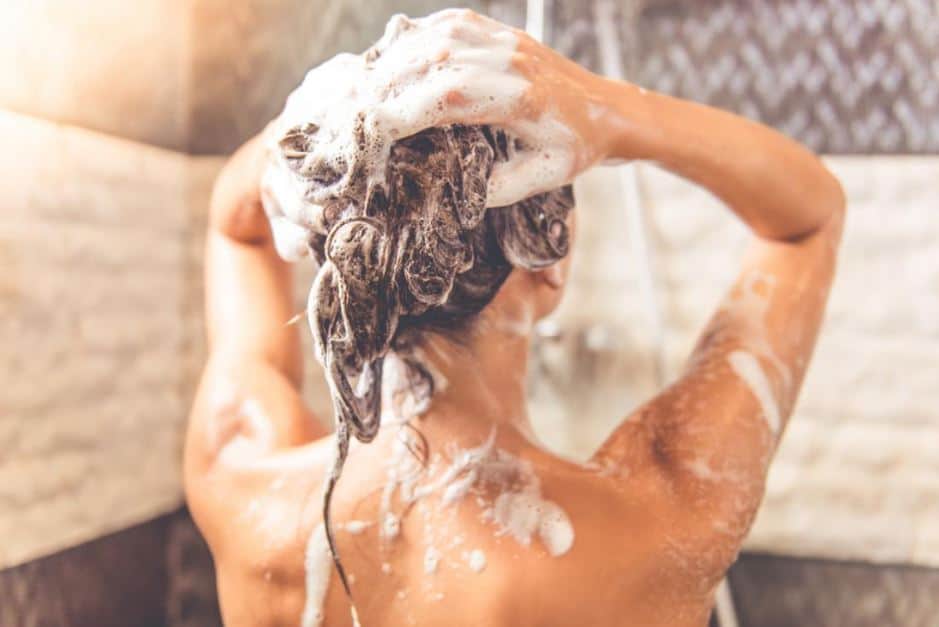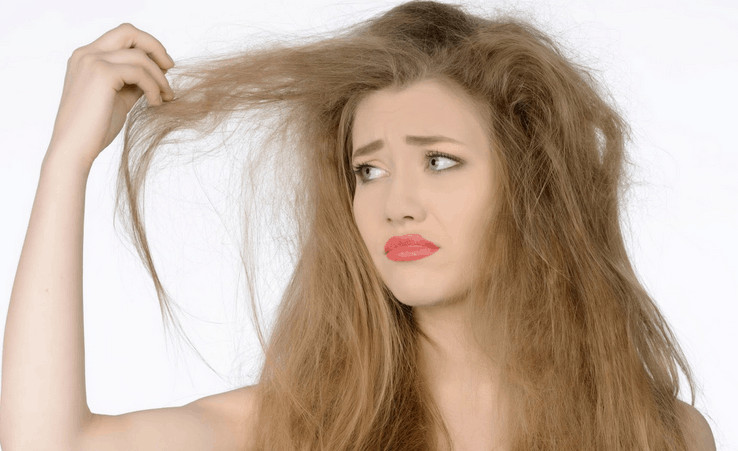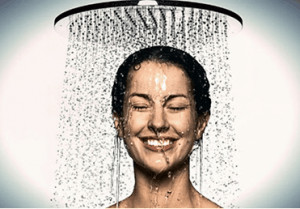Should You Shampoo Your Hair Every Day?

A friend recently showed me this reel of shampoo commercials from the early 1980’s because I was feeling a bit down and needed a quick pick-me-up. It made me smile – the drama, the music, the fashion. And all of that flouncy, bouncy, shiny hair begs the question: should you shampoo your hair every day?
A different way to phrase it would be: how often should we be washing our hair? Is there a rule of thumb? Why is shampooing so necessary? Or better yet – is it necessary? Why not go ‘no poo’, and see where it takes you? The substance we know as modern shampoo is almost 100 years old. But these questions always come up, and they never stop being relevant. First, let’s examine what shampoo is about.
Hair Washing Explained

The modern shampoo that we know has been around for almost 100 years.
The role of shampoo is to cleanse the scalp and hair. Any other function is secondary. When we use shampoo, we help the water with its job of washing away dead skin, grime, excess oil, and even scents (such as smoke). Much like we use soap to cleanse the skin, we use shampoo for the scalp. The liquid variant of shampoo – the one which we all know and love – was first invented by Hans Schwarzkopf in 1927. The rest is history.
Over the years, beauty and hair care companies have come up with countless types of shampoos. Each has its own angle and niche for hair washing. Yet they all aim to achieve the same basic hygienic task – to keep the scalp and hair clean. You can discuss special additives and unique formulas until you’re blue in the face. But if the shampoo doesn’t achieve scalp and hair cleanliness, it has failed you.
We wash our hair regularly to keep it manageable and healthy. Hair is a big part of our species, even though it’s really just a massive collection of dead protein strands. We maintain our hair, we care for it, and we groom it. And it undeniably plays a role in our courting and mating rituals. Many faiths and traditions attribute significance to hair or a lack of it. This holds true across time, cultures, nations, and people.
And while we’re on the subject of cultures and nations – you’ll be seeing different types of hair wherever you go, and subsequently different ways to wash that hair. The most obvious variations in hair types are closely related to genetics and climate. But they are not the only factors.
Why Shampoo Needs Can Differ

Everyone’s hair has different needs.
Hair types are typically broken down into straight, wavy, curly, kinky. Thickness of strands, volume of hair, along with dryness or oiliness of the scalp – these variables are also part of your personal hair equation. And this is why shampoo needs can differ.
Your personal shampoo-related needs may not reflect those of others. According to your place on the hair type spectrum – and according to your hair care routine at large – certain shampoos will be more effective than others. Some of them will be downright ineffective. And some may even cause damage by overloading the scalp with substances, causing blockage.
People with tight, curly, coily hair, for example, can go longer without shampooing. That’s because their natural oil (aka sebum) usually takes longer to travel and coat the hair shaft after secretion. The body will not have to secrete as much sebum, which will result in hair that less greasy and which requires less intervention. This is why shampoo-related needs can differ greatly from one individual to the next, and why it’s important to find a shampoo that addresses your hair types and fits it in the best possible way.
Alright, let’s say you find a shampoo that suits you perfectly – should you use it every day? If it does its job, you won’t need it more than once or twice a week. There is a relatively small number of people who do need to shampoo more often than that, but before we touch on that let’s explore the disadvantages of shampooing every day.
The Dangers of Shampooing Your Hair Every Day Explained

Many people don’t need to shampoo their hair more than three times a week.
Overwashing – is there such a thing? This question is still being debated among hair aficionados. It’s clear that shampooing every day has the potential to harm your scalp and hair’s health, even if you use the most gentle brands.
Some dead skin and oil is natural and beneficial. It constitutes a physical barrier between the scalp and the outside world, providing another layer of protection. The danger of shampooing your hair every day is that you could end up stripping the scalp of its oils completely, which often results in the body overproducing sebum.
Many shampoos advertise themselves as a product meant for daily use. But most people need to shampoo significantly less, maximum three times a week. Shampooing your hair daily may lead to product buildup on your scalp. This could clog your pores or roots, disrupt normal sebum production, and make your scalp and hair greasier and more susceptible to outside invasions.
Sebum is secreted by sebaceous glands, which are located right by each individual hair follicle. The oil is then usually spread by brushing or combing the hair. In certain cases, the sebum itself can build up on the scalp, and this is partly why we shampoo in the first place.
But what if you live in a climate where it’s overly humid and not sympathetic to certain types of hair? It that case, you may find you do need to shampoo every day in order to counter the effects of the outside world. Likewise, individuals who work out on a daily basis, who work manually outdoors, and those who get their scalp caked with sweat and dirt and debris on the regular – they are a group which should probably be washing daily.
The Dangers Of Not Shampooing Often Enough Explained

Help fight off dry, frizzy hair by maintaining your pH balance
Like Mufasa tells Simba in Disney’s The Lion King: “everything exists in a delicate balance.” Maintaining one’s hair also requires balance. Okay, so most of us don’t need to shampoo every day – check! But it’s also quite possible to not shampoo often enough. Although liquid shampoo is a relatively new invention, methods of cleansing the scalp have been around for ages: essential oils, vinegars, boiled berries, and many more techniques.
Even during times when the body is functioning normally and all is well, you’re bound to find oil and debris on the scalp. It’s part of the natural state of hair. Because at any given moment, a large number of your hairs are going through a growth phase and are receiving sebum. A smaller number (about 10%) is going through its shedding phase and is in the process of disconnecting from the scalp and being shed. Furthermore, the scalp’s skin itself is always regenerating, like the rest of our body’s skin. So we see that oil production, hair shedding, and dead skin are all part of the Great Circle of Hair, Simba.
You could get away with not washing your hair for a long while if you wanted. But the danger of not shampooing often enough is that at some point you will undoubtedly begin to experience some flakiness or itching, at the very least. The scalp needs to be cleansed periodically, whether it’s by using modern-day shampoos or more traditional methods. Both are valid, as long as they get the job done. There are some who only wash with water, and I will get into that later.
Clean hair is happy hair. This remains true pretty much across the board, and you’d be hard-pressed to find someone who disagrees with that statement. The dangers of not shampooing often enough would be:
- There is a greater chance of sebum and dirt buildup, which may lead to an unpleasant scent while bacteria breaks down the oil
- The hair may become filthier, depending on your circumstances
- Anything you put in your hair is gonna stay their for a while, most likely, so this limits your use of styling products
- Clogged pores may pave the way to irritation and even scalp acne, much like regular acne can be brought on by clogged skin pores
- Itchiness and flaking could easily turn into full blown inflammation, which weakens the hair and could even cause hair loss in some cases
- Scalp pain as a result of the hair’s nerve endings’ reaction to the aforementioned situations where the integrity and strength of the hair is compromised
So, How Often Should You Shampoo Your Hair?

After rebalancing your scalp, you’ll learn when your hair needs to be washed.
Do you find yourself wondering how often you should shampoo your hair? The short answer is there is no answer. But you can’t go wrong with twice a week. Your specific scalp and hair type can teach you a lot more than an online blog post ever could.
Step away from products for a few weeks. Get a sense of what your scalp does naturally and what it needs. After that, experiment with schedules, products, and methods of cleansing to learn what your scalp likes and dislikes.
We saw earlier that whether you’re washing too often or not enough, some of the end results may be similar: buildup, risk of inflammation, greasy hair, scalp sensitivity, and flakes. These symptoms signal an imbalance, and sometimes that could be related to a separate condition. If the symptoms persist, see your GP or dermatologist for diagnosis.
Some people set aside specific days for washing. But your scalp will let you know when it’s time for shampoo. After a while of watching your scalp and hair, you’ll be able to identify when your head requires maintenance. You’ll anticipate it and act accordingly.
In general, those with a naturally oily scalp should be washing more frequently. Those with less oily hair can wash less frequently, but should nonetheless be vigilant. If overused on a normal scalp (not too oily), the shampoo won’t be as effective. And more than that – it may end up stripping the scalp more than necessary and rough up the delicate follicles in the process.
Keep in mind that all of the factors mentioned previously also apply here. Your shampoo needs can be affected by diet, lifestyle, stress, pregnancy or menstruation. Treat your hair right by learning its natural preferences before subjecting it to overwashing, underwashing, or use of the wrong shampoo.
Can You Not Shampoo At All?
I said clean hair is happy hair, and I stand by that. But who said cleanliness has to come from external products? I mentioned techniques and methods used as cleansers in days of yore: vinegar, berries, essential oils. But is it possible not to wash with any products and still have healthy hair? Can you not shampoo at all?
Is it possible for hair to clean itself? Why does it need harsh interventions in the form of modern shampoo? It seems that sebum issues can present themselves whether you use too much or too little shampoo, so why not let the body go back to its default setting? Welcome to ‘no poo’.
The most common version of ‘no poo’ involves using products which are DIY or at least non-commercial hair care products (e.g. apple cider vinegar or lavender water). The more “gung ho” version advocates for only the use of water. Plain and simple.
If you have hair that’s not too long or thick, it will often find a sebum balance on its own. Once you stop using products, the hair can become self-maintaining. The scalp learns over time how much sebum it needs to produce and it gets into its own rhythm. This method is definitely not for everyone. Also, it can take time, so be in it for the long haul.
You can stop shampooing and conditioning your hair. But if you want your locks to remain healthy and vibrant, you need to mimic the action of shampoo. This means rinsing the hair with water daily. And it means brushing and/or combing, at least a couple of times a day, to get rid of any dirt, shed hair, and flakes that are in the hair.
Conclusion
Hair is an amazing thing. In the highly-quotable column ‘Advice, like youth, probably just wasted on the young’ written by Mary Schmich, it says: “don’t mess too much with your hair, or by the time you’re 40, it will look 85.” I tend to agree. Hair is indeed resilient and tough, but it can become frail and brittle when people mistreat it.
I totally understand why people do different things with their hair. It’s hair, it grows back, the end. Theoretically, as long as you’re not suffering from thinning and/or hair loss, you can do what you want with your hair and it may not make a big difference later on. Dye it, fry it, tie it, abuse it with devices and tools – it will shake it all off and come back with a vengeance.
Yet hair can be fragile. You need to provide it with the right kind of environment and nourishment so that it can keep developing healthily. Most of us want a happy and healthy head of hair, and that requires some work on our part. It doesn’t have to be so much work, by the way. Many people can have pretty great hair with a rather minimal routine, providing they use the products which are right for them and don’t style their hair to oblivion.
Bottom line: don’t shampoo every day, unless it’s called for. Otherwise, keep it less frequent. It saves time, saves money, saves water, and is overall better for your hair. “If it isn’t broken don’t fix it”, they say. Likewise, there is no need to use detergents or other cleansing substances on a scalp which is already clean. No need to overdo anything. Just pay closer attention to what your body is telling you.


